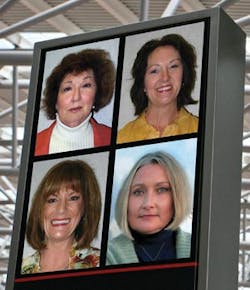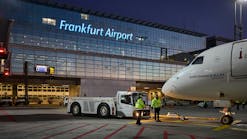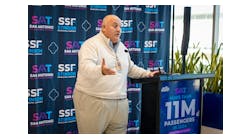Women constitute a modest portion of the total number of workers within the aviation industry. According to statistics published on the Women in Aviation International Web site, women account for 2.13 percent of more than 540,000 non-pilot aviation positions in the United States. The following women within GSE share details of how they got started in the industry.
A preference for the ramp
Working in unconventional industries has come naturally for Debra Yates. “I’ve always had an affinity for driving heavy equipment,” she says. “When I was working my way through college, I drove a D6 Cat. I was on a road construction crew. I worked in a mine, on a rig and drove an 18-wheeler.”
Yates stepped into the airline industry in 1983 as a customer service representative for America West Airlines. In a role that encompassed myriad responsibilities, Yates formed a preference for the ramp. “We were cross-utilized at the time, which was really interesting,” she says. “I worked in-flight, worked on the ramp, worked in baggage systems, reservations — we worked everywhere, which was a really neat experience. Working on the ramp was always my first bid choice.”
Self-taught on the subject of GSE, Yates moved into purchasing for the airline where she remained for seven years. She pursued her chosen career through GSE sales positions at various companies. “I’ve just bounced around in the industry from selling pushback tractors, bag tractors, to deicing equipment and then aerial work platforms,” she says.
With knowledge and experience behind her, Yates formed Triton Technologies LLC about four years ago — a company that acts as a supplier of heavy equipment to airlines and aircraft manufacturers through partnerships with such companies as JLG and AeroVironment.
As a woman climbing the ranks in the GSE industry since 1989, she has established herself through knowledge and ability. “It took time for me to demonstrate that I could get out there and drive the equipment and I knew the application because of my background on the ramp,” she says. “Once that was discovered through conversations, the credibility was established.”
Yates, who taught college courses prior to her foray into the aviation industry, says the educational aspect of the GSE field is what has kept her intrigued. “It’s a continual learning process,” she says. “The teacher in me enjoys being an educator.”
From the air to the ramp
Amy Cuffel began her career at Horizon Air 18 years ago as a flight attendant. Injured on the job, she began working in the Seattle GSE shop as a coordinator administrator, learning the administration side of GSE. During her recovery, she spent time in the shop and learned the trade of technicians by servicing the equipment and learning about parts.
In August of 2006, she was named the manager of SEA GSE, overseeing 14 stations in Canada, eastern Washington, Nevada and southern California.
Not yet two years into her new role, Cuffel says she has enjoyed the challenges incorporated in ensuring the equipment works for agents out on the ramp. Still very much in the early stages of learning, she has taken on the position with a sense of humor and relentless inquiry. “One of the biggest frustrations I have is I don’t have the knowledge to get out here and physically help my team and that’s frustrating to me, but I help where I can,” she says. “Have your mind open, pay attention and learn as much as you can.”
Cuffel has credited Horizon Air for giving her the opportunity to reach her full potential as a manager. “They gave me a chance and I think that is so important.”
An exception to the rule
“I have loved it from the minute I got into it,” Johnnie Telford says.
Telford entered into the GSE industry when she and her husband formed JohnRich Corporation and Telford Designs in the early 1990s. The company designs equipment for passenger loading bridges, along with performing installs, refurbishments and maintenance of passenger loading bridges.
Telford brought innovation to the industry through her prior experience as an adjuster for workers’ compensation claims. She brought her knowledge of workplace injuries to the patents of a sideshift cab and conveyor bag chute. “That’s how I came up with the idea of the patents, because after we started my company I saw how many people got hurt lifting luggage and other items. Shoulder and back injuries were and still are the most common injury,” she says.
The patents have gained momentum in the industry — they have been installed in 175 locations in the last year and a half, Telford says.
From inspecting the bridges to selling the equipment, Telford has engaged in all aspects of the business. But such an aggressive and somewhat perfectionist attitude has proven challenging at times. “That’s my problem; I can’t seem to delegate, because if the quality is not to the customer’s and my standards, the problem falls back on me and my company. So in most cases, it’s easier for me just to do it,” she says.
Telford says the industry has continually presented itself anew. “It’s exciting,” she says. “It’s never the same thing. You get to meet different people; you get to deal with different people all the time at different levels.”
Telford revels in the fact that she is one of few women in the industry. “I like it because I’m a woman and you don’t run into many women in the airline business,” she says. “It’s kind of being an exception to the rule.”
A Passion for GSE
“It always fascinated me, being in the industry,” says Jody Lonergan, corporate GSE manager for Continental Airlines.
Lonergan began her career in aviation with Continental 18 years ago as a secretary in ground support operations. She held multiple positions within operations, including regulatory training, before moving over to the equipment sector seven years ago.
In her current capacity as manager of corporate GSE, Lonergan is responsible for the global inventory of GSE, environmental emissions standards, capital procurement and facility maintenance — to name a few.
In her experience, Lonergan says proving her credibility has been a consistently challenging endeavor — one she has thrived upon. “It really is almost a daily thing, which is good because it keeps me challenged and keeps me up on everything that’s going on in the industry, which I think is great,” she says.
At Continental, Lonergan says her team has constituted a combination of men and women. “We have counterparts and peers within the Continental organization that we all have mixed duties and responsibilities and it’s comprised of a mix of men and women, which I think is fantastic,” she says. “We each bring our own strength to it.”
A passion shared
A unifying theme, the women have voiced dedication to their work in the industry. It is dedication bred by genuine fervor, perhaps best articulated by Lonergan. “We are very passionate about what we do, we truly enjoy what we do day in and day out,” she says. “We know that there are thousands of ramp agents out there that if we don’t do our job, they don’t have the equipment, the plane doesn’t turn, the customers don’t fly.”
That’s a sentiment that likely resonates across the industry at large for both men and women.




